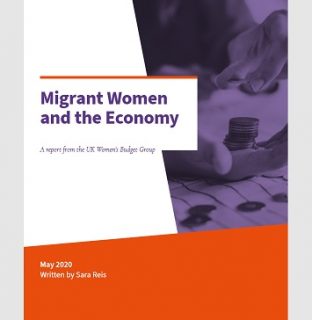Migrant women, COVID-19 and unfair laws
 We need to value the contribution of migrant workers.
We need to value the contribution of migrant workers.
Many migrant women currently providing lifesaving care and vital services during the Covid-19 outbreak, risk being left without support by UK immigration rules, according to a new report published by the Women’s Budget Group and Coventry Women’s Partnership.
The report, ‘Migrant Women and the Economy’, highlights that migrant women are disproportionately represented in ‘key worker’ occupations, working in roles that put their own lives at risk to deliver crucial care.
But at the same time immigration and social security policies aimed at creating a ‘hostile environment’ mean migrants can be left with no rights to social security or vital services if they are unable to work because of Covid-19.
The report shows that:
Most migrant women have no recourse to public funds, meaning that if they lose their jobs, hours or home they cannot claim benefits like Universal Credit, Housing Benefit or get homelessness support from their local authorities;
Migrant victims/survivors of abuse who have no recourse to public funds cannot get access to women’s refuges, as refuges are dependent on Housing Benefit for their bricks and mortar funding;
Despite being overrepresented in frontline work like care, migrant women are paying for the NHS twice – through the Immigration Health Surcharge and via their taxes;
Undocumented migrants may fear seeking treatment from the NHS due to links with immigration enforcement and fear of charging; and
Migrant women in detention centres are at high risk of contracting the virus in a place with no adequate staff, space for social distancing or healthcare.
The report recommends that the government:
Review the ‘no recourse to public funds’ policy: ‘No recourse to public funds’ means that a person is unable to access welfare benefits as well as public housing.
It indirectly discriminates against migrant women who are more likely to rely on these services due to caring responsibilities and low pay;
Extend the Destitution Domestic Violence Concession (DDVC) to all migrant women victims of VAWG: The DDV concession should be extended to migrant women with insecure immigration status to protect and support all women who are victims of violence; and
Assess the impact immigration policies have on equality. This means looking at the different economic position of women and men and the specific challenges different groups of women face and how policies will help address this and promote equality.
Dr Sara Reis, Head of Research and Policy at the Women’s Budget Group, and author of the report, said: “The report highlights that the problems with the rules of the current immigration system have never been starker.
“We have seen how dependent our NHS, social care services, agriculture, food production and distribution are on the labour of migrant workers.
“We have seen MPs recognise that many of the people who would be excluded under the government’s proposed new immigration rules are actually key workers: supermarket cashiers, care workers, and hospital cleaners.
“It is now time for fundamental change, rethinking of whose jobs are crucial, and valuing the contribution of migrant workers through an immigration system that centres on the care and wellbeing of people and reflects their lived experiences.
“We must do things differently – and – most importantly – we can.”
Elizabeth Jiménez, Policy and Communications Coordinator on violence against women and girls at the Latin American Women’s Rights Service, (LAWRS), said: “This report rightly evidences how the hostile environment has enhanced barriers for migrant women seeking support to flee violence and exploitation and improve living conditions.
“The impact Covid-19 has had on migrant women has been disproportionately high, particularly for those with insecure immigration status and no access to public funds.
“Migrant women are also overrepresented in sectors of employment characterised by lack of regulation and over-exploitative practices. As a result, many migrant women are living and working in precarious conditions and at risk of destitution.
“This public health crisis has shed light upon the urgency of ensuring that all women, regardless of their immigration status, should be able to access safety and justice.”
To read the full report, click here.
Pleasse forward this report to your MP and ask them to support the recommendations. Thank you.















